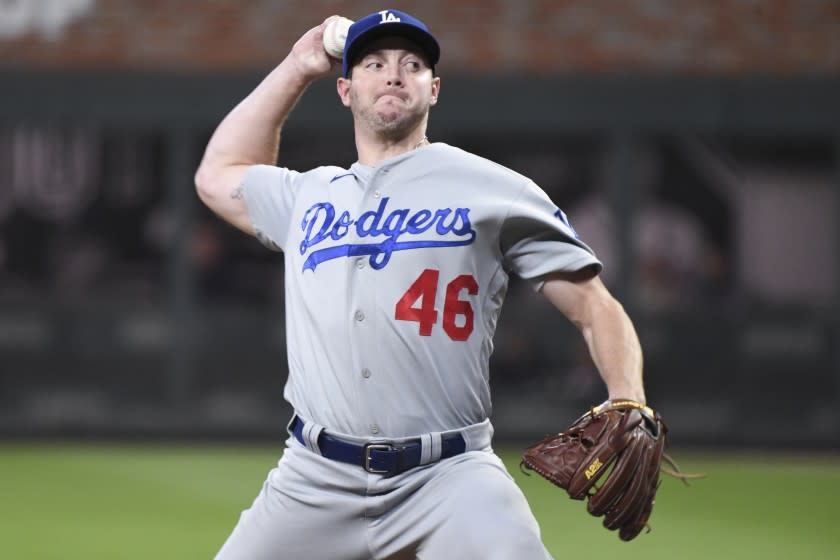Commentary: Wall Street Baseball heading for a bust on opener pitching strategy?

The Dodgers boast a long and distinguished lineage of Game 1 starters: Sandy Koufax, Don Drysdale and Don Sutton, Hall of Famers all. Clayton Kershaw, a Hall of Famer in waiting. Orel Hershiser, Tommy John, Fernando Valenzuela, Zack Greinke, Burt Hooton, Jerry Reuss and Walker Buehler, a constellation of All-Stars.
The starting pitcher for the Dodgers on Saturday, in Game 1 of the National League Championship Series against the Atlanta Braves: Corey Knebel.
What in the name of Tommy Lasorda is going on?
First things first: Max Scherzer would have started Saturday, had he not closed Thursday. The Dodgers decided to give Scherzer an extra day of rest and, well, someone had to start.
Tony Gonsolin could have. Knebel was not a starter in the minor leagues, or even in college. The Dodgers decided a reliever getting the first three outs was their best path to getting them all.
Knebel was the Dodgers’ opener, at a time Major League Baseball is exploring whether to put a close on the era of the opener.
Wall Street Baseball is the quest to find and exploit even the tiniest of advantages. Just win, baby, and who cares about the aesthetics?
The Tampa Bay Rays invented Wall Street Baseball. Their baseball department puts a good team on the field. Their marketing department cannot persuade fans to come see the team.
The Rays might say their low revenue gives them no other option. What worries the league — and the players’ union — is that too many teams might try to copy this aspect of the Rays’ winning ways.
“From a fan’s perspective and baseball as a whole,” Scherzer said Saturday, “if you look at it more from the game outside and say, ‘Is this something that ... we want the game to go into? Do we want to see this in the regular season?’ my answer is no.
“No, you don’t. You want to see starting pitchers. You want to see starting pitchers pitch deep. I think that’s best for the fans, best for the players, everybody involved. I think that’s how we all envisioned the games.”
We could have seen Scherzer against Max Fried on Saturday. We got Fried, against Knebel and a parade of following pitchers.
That might have been a special circumstance, but starting pitchers can have marquee value over the course of a season. Anticipation drives ticket sales, and the chance to see Scherzer or Kershaw or Jacob deGrom can lure fans.
In an Ipsos poll released Thursday, Americans were asked to name their favorite sport. Football ranked first, with baseball and basketball tied for second. However, in a glaring warning to a league already concerned about cultivating a younger audience, the Gen Z segment of the Ipsos poll had football ranked first and baseball sixth, with basketball, soccer, hockey and volleyball in between.
Dave Roberts, the Dodgers’ manager, minced no words when asked what he thought about the opener strategy the first time he saw it.
“I hated it,” he said. “It wasn’t baseball.”
Roberts said he has softened his stance since then. His job is to win and, if the opener can help his team win, he gets it.
But how much of an advantage does one team get out of an opener when most every team tries it?
“The Rays kind of captured a marginal advantage for a few years,” Roberts said. “So the industry’s catching up.”
In the 2018 NLCS, the Milwaukee Brewers lacked good starters and opted for an arsenal of openers against the Dodgers, including Wade Miley for a memorable one-batter stint. In this year’s NLDS against the Braves, the Brewers started actual starters, and very good ones: Corbin Burnes, Brandon Woodruff, Freddy Peralta and Eric Lauer.
“This is the best way to do it,” Milwaukee manager Craig Counsell told Andy McCullough of the Athletic. “This is what every team would prefer.”
MLB used the minor leagues and independent leagues this year as a laboratory, testing rules changes that included robot umpires, limits on defensive shifts and pickoff attempts, a 15-second pitch clock, and moving the mound back one foot.
A little-noticed change, in the Atlantic League: the test of a “double hook” rule, in which a team would lose its designated hitter when it removed its starting pitcher. Use an opener for an inning or two, and the DH would get one time at bat, followed by pitchers or pinch-hitters.
The early returns were promising, said Michael Hill, MLB senior vice president of on-field operations.
“It’s worth further discussion,” Hill said here Saturday.
With a universal DH up for discussion, so is this.
“I think it’s got a little bit of momentum,” said Andrew Friedman, the Dodgers’ president of baseball operations. “Enhancing the value of a starting pitcher, with diminishing the value of a one-dimensional slugger, directionally makes sense to me.”
In the interview room before the game, Scherzer said he was fine with the Dodgers’ strategy Saturday and said the question of whether to restrict openers was best left for the offseason.
In a January column, Jayson Stark of the Athletic introduced the concept of the Double Hook. As Scherzer left the interview room, he greeted Stark and cited that column.
Scherzer appears to like the concept. Do you?
This story originally appeared in Los Angeles Times.


